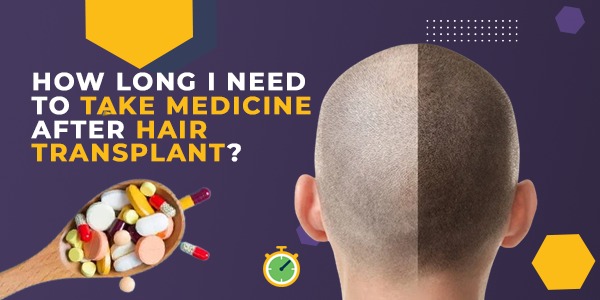Transplanting hair follicles from one portion of the body (usually the back or sides of the head) to areas with thinning or no hair is a careful technique known as hair transplant surgery. To guarantee proper healing, reduce discomfort, and promote the best possible outcome, it is important to follow a specific medication schedule after surgery. Following a hair transplant, the following complete list of medications and their recommended duration is provided:
- Antibiotics: After surgery, antibiotics are usually administered to avoid infections. Patients are frequently instructed to take antibiotics orally for a duration of five to seven days. To reduce the danger of post-operative infections, you must follow the surgeon’s instructions in the letter.
- Painkillers: Following a hair transplant treatment, pain and discomfort are typical. Usually, patients receive pain medicine, frequently in the form of mild painkillers. Each person’s need for pain medicine has a different length. Generally, following surgery, patients may require pain management for a few days to a week.
- Anti-Inflammatory Medicines: These medicines help in the reduction of swelling, a frequent problem following hair transplant surgery. The medications may be given for a brief period, often three to five days, or until the swelling significantly reduces.
- Steroid Medications: In order to reduce inflammation and speed recovery, steroids are sometimes recommended. They are frequently administered in tapering dosages, which involve a slow reduction in dosage over a few days to a week. The length of the steroid treatment varies based on the surgeon’s assessment and the patient’s rate of healing.
- Topical Antibiotics and Antiseptics: Patients may also get topical antibiotics or antiseptic solutions to apply to the donor and recipient sites in addition to oral medicines. These help in the avoidance of infections and facilitate a seamless healing process. Usually, patients are told to use these topicals for a week, or longer if the surgeon recommends it.
- Minoxidil (if prescribed): Following hair transplant surgery, some surgeons advise using minoxidil, a drug that stimulates hair growth. If a patient was taking minoxidil before the procedure, they may restart it soon after, as directed by the surgeon.
- Follow-up Care: It’s important to schedule routine follow-up visits with the surgeon. The surgeon assesses the patient’s healing status, discusses any concerns, and may modify the medicine dosage according to the patient’s needs and response during these appointments.
It is important to remember that the particular drugs, amounts, and length of time may change according to the condition of each patient, the complexity of the procedure, and the surgeon’s advice. Patients should report any unexpected symptoms or concerns as soon as they arise and should always attentively follow their surgeon’s recommendations. The hair transplant process is more likely to be successful and provide the best results in the long run when the recommended medication schedule is followed properly.
AuQual Hair Services is a leading hair transplant clinic in Raipur. The clinic offers a range of hair restoration procedures, including Follicular Unit Extraction (FUE) and Follicular Unit Transplantation (FUT). AuQual Hair Services is committed to providing the highest quality hair transplant in Raipur and care to its patients and is known for its experienced team of Hair Transplant surgeon, state-of-the-art facilities, and commitment to patient satisfaction. If you are interested in learning more about hair transplantation at AuQual Hair Services, please contact the clinic or book an appointment.

